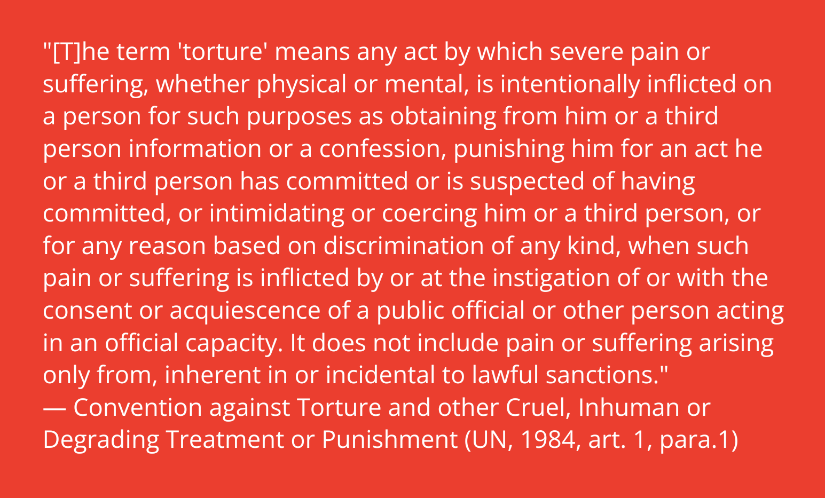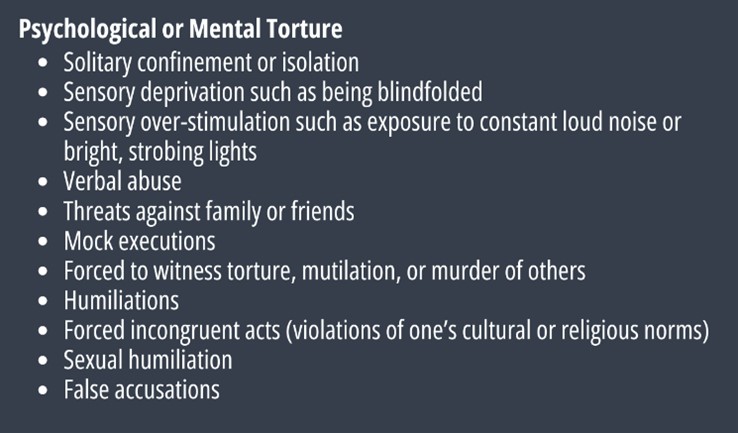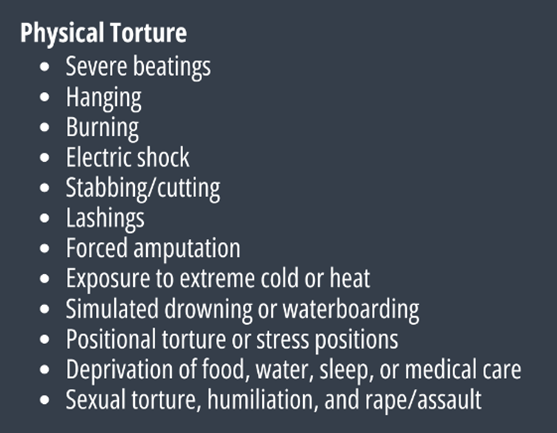
Updates from the Front Lines:...
To commemorate National Human Trafficking Prevention Month, USCRI, along with the University of South Carolina, Georgetown University’s Institute for the...
READ FULL STORY
Written by: Rosalind Ghafar Rogers, PhD, LMHC, Clinical Behavioral Health Subject Matter Expert
with USCRI’s Refugee Health Services in Arlington, VA
June 20th is World Refugee Day and June 26th is the UN International Day in Support of Victims of Torture. In recognition of both, USCRI celebrates the strength, resilience, and courage of millions of people around the world who have been forced to flee their homes to escape conflict, war, and persecution, and we reaffirm our condemnation of torture wherever and whenever it occurs and stand in solidarity with refugees and survivors of torture.
As of 2022, more than one hundred million people worldwide have been forcibly displaced due to war and conflict (UNHCR, n.d.). Forcibly displaced people encompass refugees, asylum-seekers, and other people in need of international protection (IOM, 2019).
Asylum-seekers are people who intend to seek or are awaiting a decision on a request for international protection (IOM, 2019). As of the end of 2022, there were 5.4 million asylum-seekers globally (UNHCR, n.d.). Refugees are people who have fled their countries to escape conflict, violence, or persecution and have sought safety in another country. There are currently 43.4 million refugees worldwide (UNHCR, n.d.). As some of the most marginalized groups in society, asylum-seekers and refugees are often exposed to numerous health risks associated with the various stages of migration. While in their home countries, asylum-seekers and refugees are often exposed to multiple traumatic events that lead to their forced displacement, such as war, other forms of violence, extortion, and witnessing or experiencing torture. Once they have fled their home countries, asylum-seekers and refugees face perilous journeys that are characterized by profound uncertainty, unpredictability, and a lack of security. Once they arrive in their country of eventual resettlement, asylum-seekers and refugees face additional challenges, stressors, and trauma, such as unemployment, language barriers, inadequate housing conditions, prolonged visa uncertainty, detention, social isolation, and discrimination. Due to the cumulative impact of these traumatic and stressful experiences, asylum-seekers and refugees are fifteen times more likely to have posttraumatic stress disorder (PTSD), as well as elevated rates of depression and anxiety compared to the general population (Song et al., 2018).
Among the 43.4 million refugees worldwide, as many as 44% living in the U.S. are also torture survivors (CVT, 2023). As one of the most traumatic life experiences, torture is most prevalent in war-torn regions and areas where human rights violations are common. Torture is an illegal act that seeks to annihilate a victim’s personality, deny their inherent dignity, and destroy their will. Extending beyond an isolated act against an individual, the consequences of torture are pervasive – spreading fear and intimidation through communities and transmitting it across generations.

There are many different forms of torture, including physical, sexual, mental, or psychological, and some forms that cannot be neatly designated as one or other. Below are some common forms and methods of torture that have been reported by asylum-seekers and refugees:


Research evaluating the impact of various forms of torture have found that psychological torture and degrading treatment are associated with increased symptoms of PTSD (Song et al., 2018) and have been found to cause as much emotional distress and long-term mental health issues as physical torture (CVT, 2023). Additional research has found associations between physical and sexual torture and PTSD, depression, insomnia, and somatic symptoms (Abu Suhaiban et al., 2019). Moreover, pre-migration experiences, such as sexual assault, and post-migration factors, such as financial and legal insecurity, are associated with worse posttraumatic stress outcomes (Abu Suhaiban et al., 2019).
For asylum-seekers and refugees who are survivors of torture, the physical and psychological consequences are often compounded by further trauma and challenges caused by migration. Although the physical scars of torture are more apparent, the longer-term mental health consequences often go unseen and unaddressed. Research has shown that exposure to torture is the strongest predictor of PTSD, even exceeding cumulative exposures to potentially traumatic events (Song et al., 2018), and refugees who are survivors of torture are four times more likely to suffer from PTSD and 2.5 times more likely to suffer from depression (Hvidegaard et al., 2023). Much of the research shows PTSD rates of 50% or higher and prevalence rates of anxiety or depression being up to 90% among refugee torture survivors (Abu Suhaiban et al, 2019). Moreover, torture not only severely affects the victim, but also the victim’s family and loved ones who may be at a higher risk of mental health issues. Additional psychological symptoms and health-related issues that refugee survivors of torture may experience include:
To alleviate these complex symptoms and support the healing of refugee survivors of torture, providers must begin with the acknowledgement of the unconscionable cruelty and the sociopolitical and historical context that gave rise to them (Gorman, 2001). Additional considerations and recommendations for working with refugee survivors of torture include:
We all have a part to play in ensuring that refugees and survivors of torture have opportunities to heal and thrive in welcoming communities and in advocating for international justice and a future in which torture ceases to exist.
RESOURCES FOR SURVIVORS:
To see contacts for Center for Victims of Torture (CVT) healing center locations, click HERE.
If you are a refugee or asylum seeker living in the U.S. and need care, see rehabilitative centers HERE.
If you are seeking help but are not located near a CVT center, or your problems are the result of other circumstances, please check the resources HERE.
BEHAVIORAL HEALTH RESOURCES:
For resources or more information about USCRI’s Refugee Health Services program for resettled Afghans, please visit: https://refugees.org/the-behavioral-health-support-program-for-afghans/
If you or someone you know is thinking about suicide or would like emotional support, call or text 988, the Suicide and Crisis Lifeline that is available 24/7. If you or someone you know is having a life-threatening emergency, please call 911 or go to your nearest hospital emergency room.
References
Abu Suhaiban, H., Grasser, L. R., & Javanbakht, A. (2019). Mental health of refugees and torture survivors: a critical review of prevalence, predictors, and integrated care. International Journal of Environmental Research and Public Health, 16, 2309. https://doi.org/10.3390/ijerph16132309
CVT. (2023). Facts about Torture. Center for Victims of Torture. Retrieved from https://www.cvt.org/resources/facts-about-torture/
Gorman, W. (2001). Refugee survivors of torture: Trauma and treatment. Professional Psychology: Research and Practice, 32(5), 443.
Hvidegaard, M., Lanng, K., Meyer, K., Wejse, C., & Hvass, A. M. F. (2023). What are the characteristics of torture victims in recently arrived refugees? A cross-sectional study of newly arrived refugees in Aarhus, Denmark. International Journal of Environmental Research and Public Health, 20(14), 6331. https://doi.org/10.3390/ijerph20146331
IOM. (2019). International Migration Law No. 34 – Glossary on Migration. Retrieved from https://publications.iom.int/system/files/pdf/IML_34_Glossary.pdf
Song, S. J., Subica, A., Kaplan, C., Tol, W., & De Jong, J. (2018). Predicting the mental health and functioning of torture survivors. The Journal of Nervous and Mental Disease, 206(1), 33-39. https://doi.org/10.1097/NMD.0000000000000678
UN (United Nations). (1984). Convention Against Torture and Other Cruel, Inhuman or Degrading Treatment or Punishment. Retrieved from https://www.ohchr.org/en/instruments-mechanisms/instruments/convention-against-torture-and-other-cruel-inhuman-or-degrading
UNHCR. (n.d.). Who we protect. Retrieved from https://www.unhcr.org/us/about-unhcr/who-we-protect

To commemorate National Human Trafficking Prevention Month, USCRI, along with the University of South Carolina, Georgetown University’s Institute for the...
READ FULL STORY
For more than a century, the U.S. Committee for Refugees and Immigrants has advocated for the rights and dignity of refugees,...
READ FULL STORY
By Veronica Farkas, TVAP/Aspire Case Manager My job as a Case Manager is a combination of advocacy, crisis response, and long-term...
READ FULL STORY